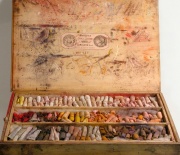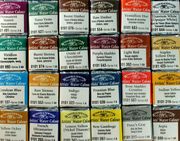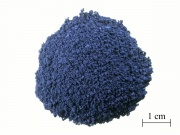Difference between revisions of "Pigment"
Jump to navigation
Jump to search
| Line 4: | Line 4: | ||
[[File:WN Artist colors.jpg|thumb|Windsor Newton artist colors]] | [[File:WN Artist colors.jpg|thumb|Windsor Newton artist colors]] | ||
[[File:indigo_powder.jpg|thumb|Indigo powder (''Indigofera tinctoria'')]] | [[File:indigo_powder.jpg|thumb|Indigo powder (''Indigofera tinctoria'')]] | ||
| − | An insoluble, dry solid that is pulverized to a fine powder then mixed with a binder to form a [[paint]], [[ink]], or [[crayon]]. Pigments can provide both [[color]] and [[opacity]]. The type and composition of pigments has changed significantly over the years. Originating as materials pulverized from minerals, modern pigments are now synthetically processed to ensure purity. Pigments discontinued due to toxicity include most containing [[arsenic]], [[chromium]], and [[lead]]. [[Titanium]], used in [[titanium white]] pigment as a 20th century replacement for [[lead white]], was listed as possibly carcinogenic in 2006. | + | An insoluble, dry solid that is pulverized to a fine powder then mixed with a binder to form a [[paint]], [[ink]], or [[crayon]]. Pigments can provide both [[color]] and [[opacity]]. The type and composition of pigments has changed significantly over the years. Originating as materials pulverized from minerals, modern pigments are now synthetically processed to ensure purity. Pigments discontinued due to toxicity include most containing [[arsenic]], [[cadmium]], [[chromium]], and [[lead]]. [[Titanium]], used in [[titanium white]] pigment as a 20th century replacement for [[lead white]], was listed as possibly carcinogenic in 2006. |
Examples of inorganic pigments: | Examples of inorganic pigments: | ||
Latest revision as of 11:53, 4 June 2023
Description
An insoluble, dry solid that is pulverized to a fine powder then mixed with a binder to form a Paint, Ink, or Crayon. Pigments can provide both Color and Opacity. The type and composition of pigments has changed significantly over the years. Originating as materials pulverized from minerals, modern pigments are now synthetically processed to ensure purity. Pigments discontinued due to toxicity include most containing Arsenic, Cadmium, Chromium, and Lead. Titanium, used in Titanium white pigment as a 20th century replacement for Lead white, was listed as possibly carcinogenic in 2006.
Examples of inorganic pigments:
- earth colors (Ocher, Sienna, Umber, Green earth);
- metallic oxides (Ferric oxide, Titanium dioxide, Zinc white; Viridian);
- metallic carbonates (Lead white, Calcite, Malachite);
- metallic chromates (Lead chromate; Barium chromate)
- carbon black (Bone black, Lampblack, Graphite)
Examples of some organic pigments are:
- animal (melanin, Cochineal, Indian yellow)
- vegetable (Madder, Indigo, Gamboge)
- synthetic (Verdigris, phthalocyanines, lakes, Para red)
Synonyms and Related Terms
pigments (pl., Fr.); pigmento (Esp., Port.);
Comparisons
Websites of pigment manufacturers
Resources and Citations
- R.L. Feller, A. Roy, E. West Fizthugh, B. Berrie, Artists' pigments: A handbook of their history and characteristics (4 vol.), NGA (Washington DC) & Archetype Publications (London)



